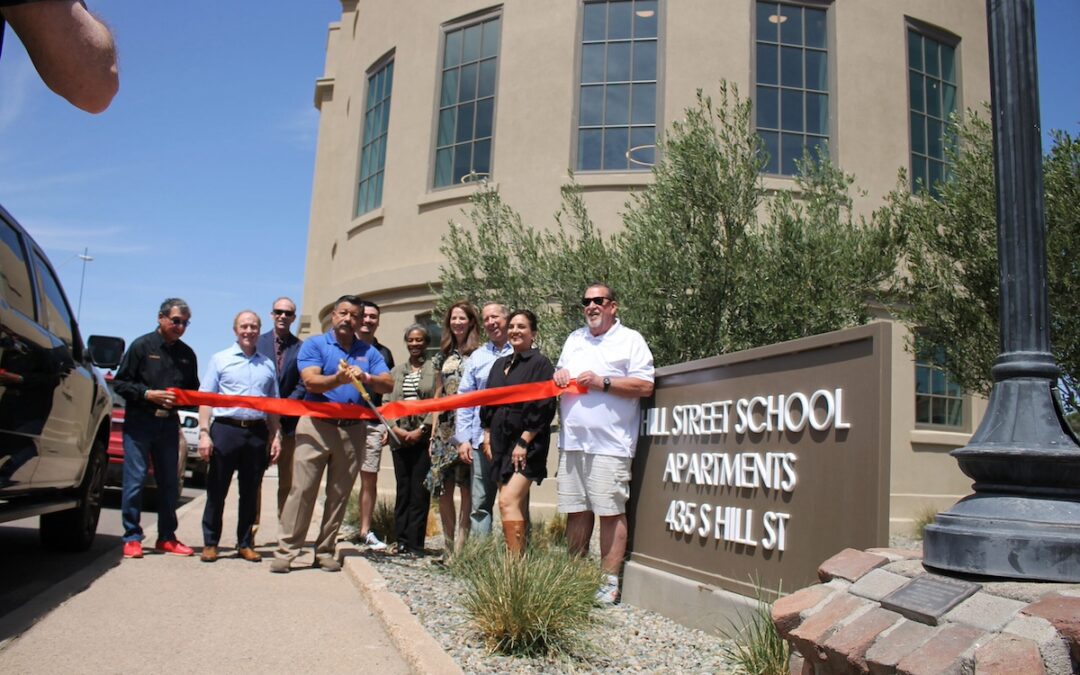
As a progressive grassroots power-building organization, Living United for Change in Arizona (LUCHA) is deeply rooted in communities across the state. We are tapping into the needs and wants of our neighborhoods struggling with the effects of the affordable housing crisis, rising grocery bills, and a climate crisis that continues to pummel Arizona with record-breaking droughts and heat.
LUCHA firmly believes that the people closest to the problem are the ones closest to the solution. This very concept has transformed how we support candidates and push for sound policies and reforms. Simply put, it is not enough to elect candidates into office with a ‘D’ next to their name; gaining the trust of community members goes much deeper than party lines. We need leaders we can entrust with our vote and who will work with us at a grassroots level to address community concerns once in office.
Our communities are facing multiple challenges and threats to their livelihoods. Electing strong, morally principled, empathetic, and responsive leaders is an absolute necessity. Those worthy of our vote are those who are profoundly rooted in their communities and believe in the fundamental principles of co-governance.
Leading with those you serve
Co-governance is the idea that elected officials work not just on behalf of the community but with the community hand-in-hand, side-by-side, to address the many issues impacting their lives. Co-governance is not just a powerful concept but a practical and community-driven approach to governing.
Once you get to know your community by listening and understanding who your constituents are, their expectations, and their needs, you develop guardrails and checks and balances on your power that makes turning your back on them tough!
When big decisions need to be made, the community that elected you into office is top of mind. When you partner up with grassroots organizations like LUCHA that are connected to the very heartbeat of our barrios, you ensure that the voices of the people are central in shaping our collective future and home, not silenced.
Co-governance is alive in Tucson
Examples are few and far between, but in Tucson, we are seeing it take place from the Mayor to the city council. Tucson Mayor Regina Romero and Ward 1 Councilmember Lane Santa Cruz represent shining examples of co-governance in action. From climate change to community development to affordable housing, Tucson is shaping its city’s future so all residents can prosper.
Cities across the country are grappling with the challenges of climate change; it is crucial to understand that combating the effects must start at the local level. Mayor Romero’s commitment to protecting our environment and building a climate-resilient city is precisely the leadership our communities have been calling for. Tucson has become a national model, demonstrating that local governments must play a pivotal role in addressing the impacts of climate change.
Community-centered solutions
Romero has pushed for the community’s demands to take on climate change head-on through initiatives like Tucson’s Climate Action and Adaptation Plan. This ambitious initiative provides a strategic pathway to reduce city emissions to net zero by 2030, anticipates the impact of climate change across Tucson, identifies the most vulnerable communities to climate change, and provides robust solutions to ensure Tucson can adapt and be more resilient to the impacts of the crisis.
Under this plan, the city has invested millions of dollars into new green spaces, reducing water waste, “decarbonization” using solar technology to power government and private buildings, electric vehicle power charging stations, improving bike lanes, and making public transit more accessible.
Much like the rest of Arizona’s cities, Tucson faces multiple crises impacting our most vulnerable communities. Housing affordability has become a crisis that has led to many families unable to afford rent and lose their homes.
Through listening sessions with residents and in partnership with elected officials, LUCHA has innovated solutions with elected officials in a true co-governance spirit to find answers to housing affordability. Mayor Romero has pushed her city to expand affordable housing options, breaking ground in new affordable housing developments and working to protect renters’ rights.
The support is not limited to only families searching for affordable housing; supporting Tucson’s houseless is a focal point for the Mayor and council, using state funds to buy hotel rooms to provide our vulnerable houseless community with more permanent housing options. These policies have been instrumental in improving the lives of families in Tucson.
Improving local infrastructure and fostering a more accessible and interconnected Tucson has been a significant goal since day one for the Mayor. For years, LUCHA members in Tucson have called for improving transportation options, reducing barriers around mobility, improving safety conditions for all commuters, and filling those potholes in busy Tucson streets.
As true co-governors, Romero and the city council have significantly improved local infrastructure, making Tucson more accessible and interconnected while also ensuring communities of color are proportionally represented in urban planning. Earlier this year, Mayor Romero and the council passed an extension to the Free and Fair Transit program, which allows all residents to ride public transportation (bus, shuttle services, and street car) for free.
People-powered governance is popular with voters
Recent polling makes it clear that voters support this model, and we believe the reforms and advancements made in Tucson will swiftly reelect the two incumbents for another term. This resounding support for the Mayor’s vision underscores the importance of leadership that reflects the priorities of our barrios.
The widespread support for Mayor Romero and their policies powerfully underscore the vital role that grassroots organizing and community-based governance play in shaping our state’s future and national politics. Arizona’s future gleams with promise, but only if we can preserve the progress made and build upon our success.
If we continue this work, we will ensure a future where our elected leaders prioritize the well-being of their constituents and where we join forces in an unwavering battle for social and economic justice.
As we look ahead to the crucial 2024 presidential election, Tucson should serve as our litmus when evaluating candidates up and down the ballot. A testament to the idea that our voices matter, and responsive, community-driven government is not just a possibility but a necessity to address the critical issues before us and for our communities to thrive. Tucson is the model, but it is also a story of hope for Tucsonans, the state, and the nation.

Need help paying rent in Phoenix? These 10 programs can help
If you’re struggling to find and afford housing, these 10 rental assistance programs in Phoenix can help. Between inflation, price gouging,...

A little bit of farm, a little bit of suburbia: That’s the recipe for Gilbert’s Agritopia
GILBERT, Ariz. (AP) — Just steps from the porticos, patios, clay-tiled roofs and manicured lawns of suburbia, Kelly Saxer has gotten used to...

American Rescue Plan Act helps fund 96-unit affordable housing complex in Phoenix
More affordable housing is coming to Phoenix thanks to an allotment of American Rescue Plan Act (ARPA) funds and a unique collaboration between...

Historic school building will now serve Globe as affordable senior housing
GLOBE – The 105-year-old Hill Street School has been given a second life as affordable senior apartments, adding the first new housing to the mining...





